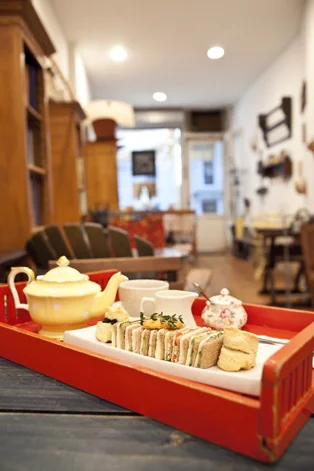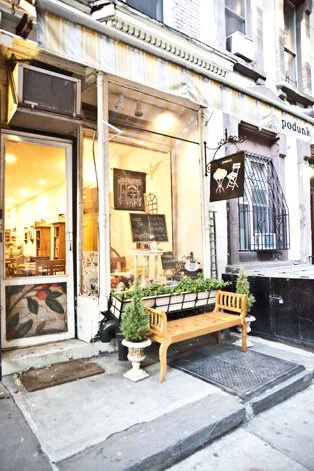In July, there are no new conversations
In July, after everyone leaves for the Fourth, the streets of New York City are so still. On days that are cool enough to use the screen door, a truck rumbling by can startle us all and rattle the teapots in the window. On warmer days, when we have the air-conditioner on, any opening or closing of our heavy door sounds like the unsealing of a vacuum.
July and August are the months in which I do “spring” cleaning, getting into the corners and sweeping up tea leaves I hadn't known I'd lost. My inspiration to finish is that I can re-do the menu for autumn once the cleaning is done, and my brain, from summer's harvest, is usually on overload with ideas for tea food by the end of August. It's like having two kinds of fevers at once, and I don't want my energy to dissipate before I've got everything in its place, literally and figuratively.
Today, a young lady with long flowing black curls had taken a seat at the marble table, and her friend, a small-framed blonde with a fresh-scrubbed face sat with their pitcher of iced tea, thumbing through bridal magazines and discussing a friend's October wedding. They were in their twenties, I supposed, and were still in their office clothes in midafternoon. On my way to water the windowbox, I caught scraps of conversation:
“Her mother and aunt are trying to run the whole wedding. You can tell they were disappointed in their own weddings.” They giggled.
“Or maybe in the marriages,” the other one replied, and they giggled again.
I moved back to the counter, past two women in their mid-thirties; they were surrounded by briefcases and handbags, and both of them had kicked off their high heels. One was sitting with her feet curled under her, and sipping an herbal brew; the other had chosen black orchid vanilla, a pot that was as caffeinated as they come, with a little sweetness built into the leaves. Self-employed, I thought. Finished with meetings or sales calls for the day, but not quite ready to unwind for the weekend.
Snatches of conversation come to me, like pieces of a poem carried by the wind. Mundane topics can be transformed by such delivery.
“I lost him in the crowd, but probably didn't need him anyway.”
“I got rid of him but kept the apartment.”
“It wouldn't be the first time a trip to Paris cost me more than just hotel and airfare.” My brain, fuzzy with baking powder and Windex, makes connections that were probably never intended, and fills in blanks that never may have been there at all.
On this day, however, one of the older women was very specifically talking about her own upcoming wedding, and she said, “My mother is trying to run my wedding, as if it will make up for what my father did.” The other woman laughed sadly.
In my imagination, the two tables were having identical conversations. Weddings, mothers, disappointments in life, the planning, the dresses, the generational tension that occurs at every such occasion—it could not have been staged more neatly.
It is very odd, this thought. For us, every day in Podunk is the same and not so; I bake the same things, in mostly the same order, but then, people arrive and order, and the day changes. Sometimes it's busy all day, and sometimes I can read the paper for a half-hour or so, but I think of us, in general, as the fixed point, and all around us are children growing up, mothers growing into their roles, students graduating, employees getting promotions, changing jobs, changing their lives, changing apartments, and even, changing spouses. Yet their paths are not as varied as I thought, for all of them, at some point, are in the room discussing: unemployment, job benefits, terrible bosses, terrible interns, office martinets, office martyrs, office nightmares, office affairs, worse secretaries; parents, siblings, grandparents, offspring, ancestors, distant relatives; boys they've met, boys they've liked, boys they've loved, boys they've lost, the boy they are marrying, the wedding they are having, the early years of marriage, the first baby, the next baby; schools, from preschool to post-graduate work; breakups, separations, divorces, second marriages, widowhood, stepparents, stepchildren, stepsiblings; and most of all, weight, fitness, body types, body thoughts, diet, exercise, carbohydrates, fat, frosting, cupcakes, scones, jam, cream.
Every day, I move among their chairs like a listening ghost, as they utter the same thoughts, come to the same conclusions—as if no one is human anymore, but an organism, taking up space in the tearoom until someone else arrives to take up similar space.
It's crushing and liberating, this realization. If everyone is alike, then our family is no happier than anyone else's, but neither are we more miserable. Our problems, past and present, have been solved or abandoned before by others, and so will we solve or abandon ours. We are even more grateful for any good fortune that comes our way, knowing how fleeting it is and that it will be visited upon others after us. We are old and experienced enough to know that suffering, too, is fleeting, and should it come upon us, we will bear it better, I hope.
Tempest in a teapot? Pour it out. Spillt milk? Here is some more milk, fresh from the dairy. Life gave you lemons? Better you than me, and hand one over; we'll use it in our tea.





